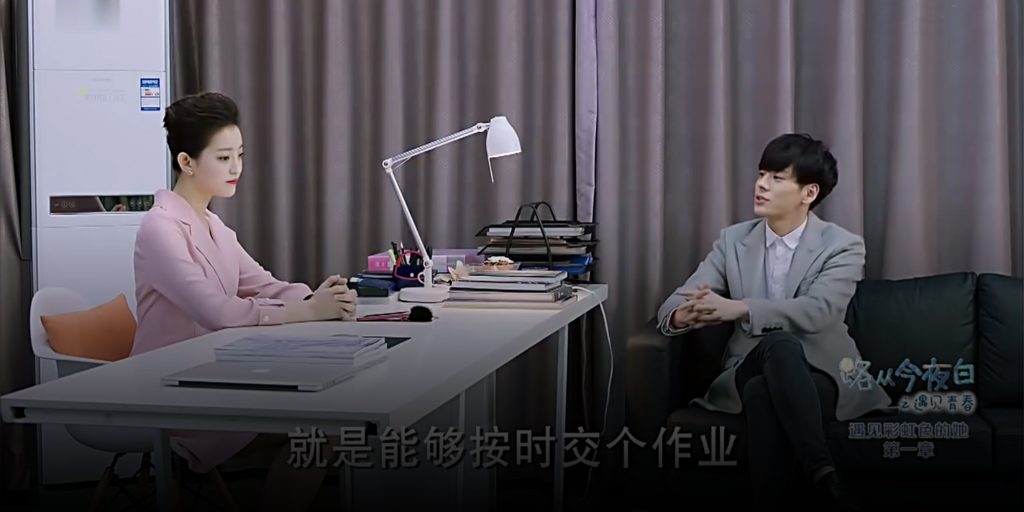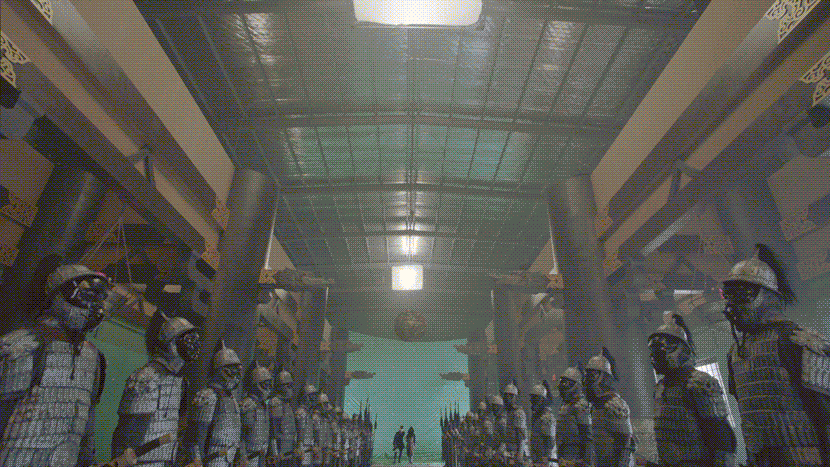The University of Nottingham Ningbo is seeking legal advice following its unflattering depiction on a Chinese TV series.

A screenshot from an episode of ‘The Endless Love,’ broadcast on Nov. 1, 2017
After allowing a popular romantic sitcom to film on its China campus, a British university received something of a rude awakening when the resulting episode aired Wednesday.
One scene in the show casting doubt on the educational standards of University of Nottingham Ningbo China (UNNC) has prompted outrage from students, school authorities, and alumni.
The contemporary sitcom — whose name loosely translates to “Road Turns White Since Tonight” but is sometimes referred to as “The Endless Love” — premiered on Nov. 1 on Hunan TV, a widely popular station headquartered in Changsha, the capital of the central Chinese province of Hunan.
The show is an adaptation of a novel by the same name and tells a love story about a young painter named Gu Yebai who goes colorblind but finds an accepting partner in Lu Youyan. According to the plotline, Gu had studied at the University of Nottingham’s Ningbo campus.
Halfway through Wednesday’s 45-minute episode, a rival painter and fellow Nottingham alumni named Wei Zijian casually refers to the university in disparaging terms during a conversation with a female art gallery executive. Wei appears unimpressed with Gu and some of his fellow students, saying: “I was also at Nottingham University for four years. I understand my fellow classmates very well — they need only hand in their assignments on time to get their hands on a degree certificate.”
UNNC was swift to react. Chris Rudd, the campus provost, condemned the school’s portrayal in the TV show as a “deliberate misrepresentation and breach of trust” between the two parties involved.
“We are also shocked to hear the misleading and inaccurate dialogue between the two characters that referred directly to the University of Nottingham,” wrote Rudd in an email sent to staff and students Thursday morning and seen by Sixth Tone. That message also listed Rudd’s titles as professor of mechanical engineering, and pro-vice-chancellor at the University of Nottingham.
The university posted a series of screenshots of the show on its official microblog account, and Rudd also accused the producers of “manipulating an image of a different university purporting to be the main gate of UNNC.”
Rudd said that while the university had granted film crews access to its campus, it had never agreed to let the show use Nottingham’s name in any form. The university will seek legal advice on the matter and has contacted the show’s producer about issuing a retraction, Rudd wrote in the email.
UNNC — the first joint operation between Chinese and foreign academic institutions — was founded in 2004 in Ningbo, a city located some 200 kilometers from Shanghai. With more than 7,800 students, it is one of a number of foreign educational institutions to have established campuses in China, with others including New York University and Duke University from the United States. Many Chinese students are attracted to such schools because they confer international degrees at a relatively cheaper price compared with studying abroad.
After Wednesday’s episode, angry Chinese students and alumni took to social media to voice their protestations. Many attacked the show’s director, Gu Yunyun, demanding an apology and an explanation for the “malicious slander.”
Shu Yuanwen, a second-year student majoring in international communications, slammed the show for implying that students at UNNC aren’t hardworking, and for questioning the school’s academic rigor. Soon after the episode aired, Shu’s social media was abuzz with discussion on the topic.
“Whatever they are saying is completely inaccurate and false,” Shu told Sixth Tone.
Hunan TV is rarely far from controversy. In September, the provincial Party discipline committee criticized the channel, known for its entertainment programming, for “focusing on high ratings and failing to guide public opinion.”
Sixth Tone contacted UNNC, Hunan TV, and Gu, the show’s director, but had not received responses by the time of publication.
– This article originally appeared on Sixth Tone.








